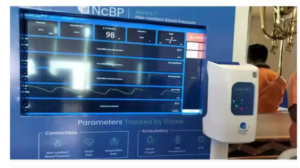In a groundbreaking development, Gaurav Parchani, a 2013 graduate of IIT Indore, has unveiled an innovative AI-based early warning system that promises to address the critical issue of staff shortages in hospitals while significantly enhancing patient monitoring. This cutting-edge technology has already been adopted by numerous government and private hospitals across the nation, marking a remarkable step forward in healthcare management.

One common challenge encountered in healthcare facilities is the shortage of medical staff, often resulting in the prioritization of critical cases while non-emergency patients face delays in care. This scarcity of personnel can lead to vital patient readings, such as blood pressure, heart rate, and ECG, being neglected, as constant nursing presence is often unfeasible.
Recognizing the gravity of this issue, Gaurav Parchani, originally hailing from Indore, decided to leverage his expertise in Artificial Intelligence to create a solution that would bridge this gap in healthcare. Initially, Gaurav worked on enhancing the performance of racing cars and related machinery, but he soon realized the potential to apply technology to the field of healthcare.
Parchani’s groundbreaking medical technology involves the use of just one sensor affixed to a patient’s bed, which takes care of the rest. Continuously conducting various tests on the patient, it displays the data on a nearby monitor while simultaneously updating the nursing station’s system. Crucially, if a patient’s vital signs deviate from the normal range, such as elevated blood pressure or signs of a potential heart attack in the ECG, an immediate alert is triggered alongside the patient’s data.
The system is composed of sensors placed under the patient’s bed to detect blood pressure, heart rate, and breathing rate, complemented by three wireless devices worn by the patient to monitor oxygen levels, ECG, and temperature. This comprehensive monitoring eliminates the need for patients to repeatedly call for assistance when they need to move around within the hospital.
This AI-powered technology has rapidly gained traction, with numerous government and private hospitals across the country embracing it. Currently operational in more than 300 hospitals, covering approximately 8,000 beds, institutions such as King George Medical College in Lucknow and PGI in Chandigarh have seamlessly integrated this system with sensors in their beds. Data from Chennai’s Apollo Hospital and Lucknow’s King George Medical College indicates that this innovative technique has saved up to 80 percent of patients by detecting changes in their condition up to 8 hours before deterioration.
Once installed in a bed, the sensor can function effectively for up to 5 years, making it a cost-effective and sustainable solution. This Made in India technology proudly boasts over 15 certificates and 8 patents. While the initial investment may appear substantial, the system’s creators assert that it can save an impressive 10,000 hours of nursing work annually, ultimately translating to significant time savings for healthcare professionals and, most importantly, more lives saved.
Gaurav Parchani’s AI-based early warning system is undoubtedly a game-changer in the healthcare industry, offering a powerful solution to the longstanding challenge of staff scarcity and enhancing patient care to new heights. As the technology continues to evolve and expand its reach, it holds the promise of revolutionizing the way healthcare is delivered across the nation.
